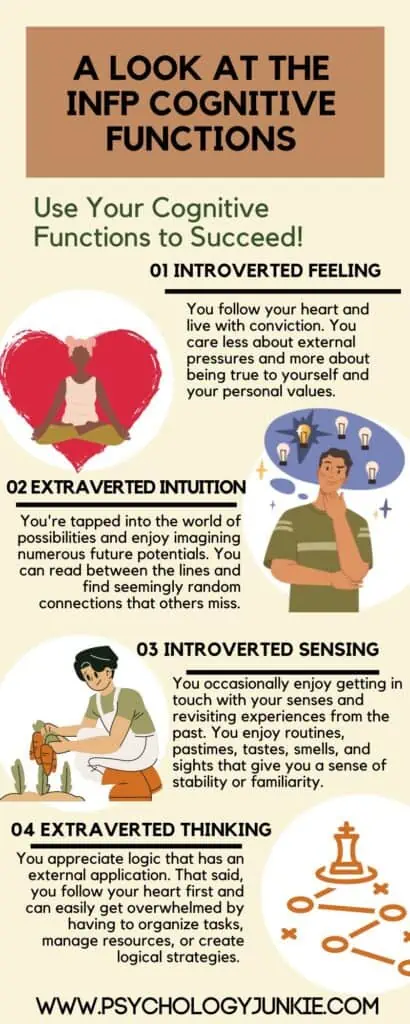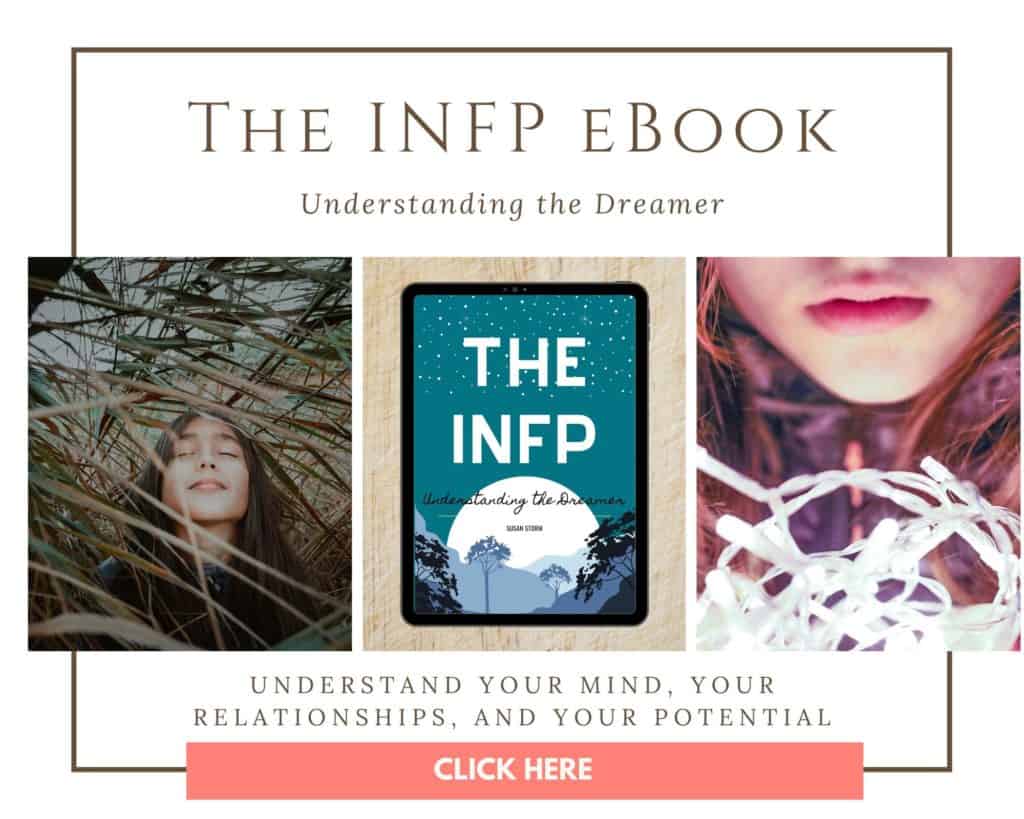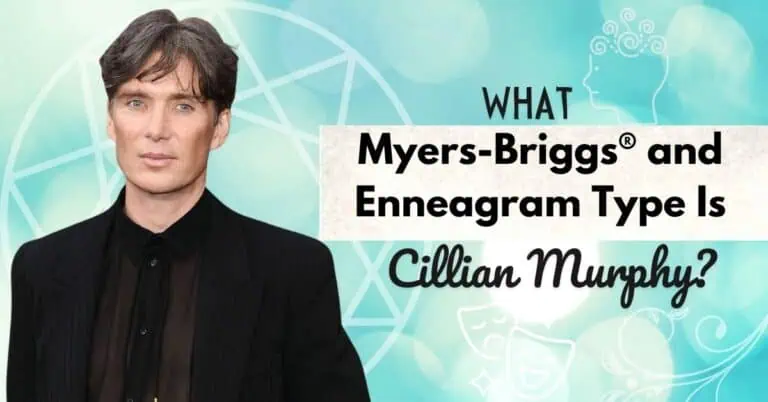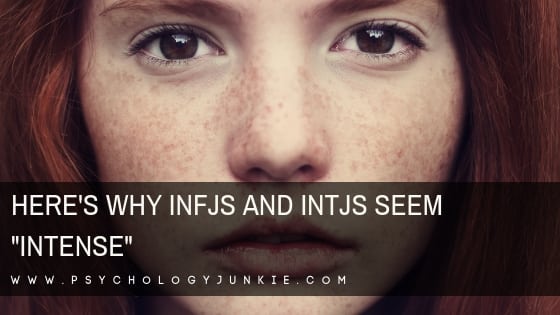The INFP Cognitive Functions In-Depth
Have you ever wondered how your mind works as an INFP? Do you have an INFP friend or partner who you’d like to better understand? In today’s article, we’re going to break down what’s called the INFP “function stack.”
What are cognitive functions?
The cognitive functions tell us the unique ways in which you use your mind. They refer to different ways of processing information, making decisions, and understanding the world. By breaking down the eight components of an individual’s cognitive function stack, you can gain greater insight into how an INFP thinks, acts and feels in certain situations. Read on to get a better understanding of what makes INFPs tick!

Not sure what your personality type is? Try out our most highly recommended personality questionnaires:
- You can take our free personality questionnaire here
- You can take Personality Hacker’s personality questionnaire.
- You can take the official Myers-Briggs Type Indicator® for $49.95
This article contains an affiliate link to a questionnaire on Personality Hacker. If you purchase one of their courses, I get a small kickback that I can use to pay for hosting and other demands of this site. I only recommend courses I love.
The INFP Cognitive Function Stack:
Dominant Function: Introverted Feeling (Fi)
Auxiliary Function: Extraverted Intuition (Ne)
Tertiary Function: Introverted Sensing (Si)
Inferior Function: Extraverted Thinking (Te)
Opposing Role: Extraverted Feeling (Fe)
Critical Parent: Introverted Intuition (Ni)
Trickster: Extraverted Sensing (Se)
Daemon: Introverted Thinking (Ti)
Table of contents
- What are cognitive functions?
- The INFP Cognitive Function Stack:
- Dominant Function: Introverted Feeling (Fi)
- Auxiliary Function: Extraverted Intuition (Ne)
- Tertiary Function: Introverted Sensing (Si)
- Inferior Function: Extraverted Thinking (Te)
- The INFP Shadow Functions
- Opposing Role: Extraverted Feeling (Fe)
- Critical Parent: Introverted Intuition (Ni)
- Trickster: Extraverted Sensation (Se)
- Daemon: Introverted Thinking (Ti)
- What Are Your Thoughts?
- Other Articles You Might Enjoy:
Estimated reading time: 14 minutes

Dominant Function: Introverted Feeling (Fi)

Introverted Feeling focuses on what is essentially important to the self. The INFP asks questions like:
“What matters to me in the long run?”
“Am I being authentic to what I really believe and value?”
“What are my emotions telling me?”
“Is this worth it?”
For the INFP, living in alignment with deeply-held core values is crucial. Honoring others’ core values is also crucial, unless they violate each others’ values by their very nature. For example, an INFP who strongly believes in animal rights might struggle to make peace with a friend who values hunting and fur trading.
When INFPs approach life they are constantly looking for things that are of emotional value to them. This doesn’t usually mean money, objects, or prestige. Often it means an intangible value; the human values that show up at the end of life. They want to end up on their death bed being happy about what they did and who they were. They want to say to themselves, “That was a life well lived and I did what I meant to do and I did it honestly.”
Introverted Feeling puts INFPs deeply in touch with their emotional responses. They storehouse their emotional responses, historically organizing them and pulling them out when the situation requires it. For example, when they are talking to a friend about the loss of a parent, they may immediately pull from the “grief” storehouse in their emotional data bank. Being allowed to re-inhabit their own grief enables them to empathize deeply with the other grieving person. INFPs engage in this process so rapidly that it can feel to them like they are absorbing the other person’s emotions, when really they are empathizing by reaching into themselves and identifying the closest emotion they can find to the one the other person is exhibiting.
Introverted Feeling gives INFPs a certainty and purpose in their lives. They get “gut feelings” when something doesn’t feel right to them, and, when healthy, they honor those feelings. If they are asked to verbalize those feelings they may get flustered; the depth and complexity of them can be difficult to explain in rational terms. At the same time, they have “gut feelings” about what is right and when they are on the path that aligns with their heart.
Because INFPs are so aware of this inner compass that guides them, they are gifted at bringing other people to the center of themselves. They urge people not to put on a mask, or facade, and to really be honest about what matters to them on a human level. At their best, INFPs can be incredibly tolerant and compassionate with people from many different walks of life. The more they understand themselves, their emotions, and motivations, the more they understand others.
Healthy Introverted Feeling Can Be: Empathetic, Authentic, Gentle, Self-Aware, Curious About Others’ Values, Understanding, Deep, and Driven by Integrity.
Unhealthy Introverted Feeling Can Be: Selfish, Judgmental of Others’ Values, Disillusioned with Reality, Self-Righteous, Self-Absorbed.
Auxiliary Function: Extraverted Intuition (Ne)
Extraverted Intuition is the part of the INFP that likes to explore, imagine, and create possibilities. This part of the INFP asks questions like:
“Is there another way to look at this?”
“What possibility does this bring to mind?”
“Can I imagine this another way?”
“How do these ideas or situations connect?”
“How do these ideas fit into a larger context?”
When INFPs are out in the world, they can see one thing and immediately be pulled into a kaleidoscope of possibilities relating to that one thing. For example, they may see a collection of rocks by a stream and be pulled into imagining a story about the rocks as entities traveling down a stream and carrying on conversations and relationships. Or they may consider creating art by stacking the rocks on top of each other. Still more ideas might be gathered by considering the consequences of additional events, such as a storm coming and changing the landscape or having dinosaurs come out of the water.
Extraverted Intuition also gives INFPs a great capacity to see patterns and make connections between seemingly disparate things. They can quickly jump from one concept to another, connecting ideas and seeing how they fit together. For example, how is a dog like a steam engine? Well, dogs bark like steam engines whistle and both need fuel to function. They might imagine which types of dog breeds could follow a track without going off the rails entirely to explore their surroundings!
Extraverted Intuition enriches the imagination of the INFP with many interpretations of the world. They are able to imagine multiple perspectives, create vivid worlds they’ve never actually experienced, or hypothesize about a dystopian future even though they’ve never been in one.
For INFPs, Extraverted Intuition is a means to add fullness and possibility to life. The INFP who is in touch with their intuition is able to think outside the box, create, imagine, and evolve. They also can help others with their intuition by dreaming up unconventional solutions to problems or inspiring others to be open to ideas that may lead them down new and exciting paths.
Healthy Extraverted Intuition Can Be: Open-minded, original, imaginative, insightful, creative, humorous, engaging, energetic, catalyzing.
Unhealthy Extraverted Intuition Can: Infer certain meanings where there weren’t any, reinvent the wheel, be overwhelmed by possibilities, catastrophize, struggle to commit to any one thing, deny responsibilities in pursuit of novelty or fun.
Tertiary Function: Introverted Sensing (Si)
Introverted Sensing is the part of the INFP that preserves meaningful memories, life experiences, and routines. When INFPs are in touch with Introverted Sensing, they ask themselves:
“What familiar pastime would stabilize me right now?”
“What’s the routine for this?”
“What are the details of the situation?”
“What are the facts I know from experience?”
Because Introverted Sensing is in the tertiary position for INFPs, it isn’t as natural as Intuition or Feeling. However, INFPs still value this function and enjoy spending time in its energy. They enjoy familiar routines, old stories they grew up hearing, or rewatching movies that hold nostalgic value.
Introverted Sensing also helps INFPs stay grounded in the real world. This is the part of the INFP that notices details, creates consistency, and relies on facts. When INFPs are interested in a particular subject, they may learn every possible detail they can find about it. They may be drawn to collecting memorabilia or keeping a detailed record of their lives via journaling. At times, they may resist new experiences, preferring instead to be in the comfort of the familiar. They get a very real sense of joy from revisiting smells sights, and tastes that have a familiar memory associated with them. For example, they may have buttermilk waffles every Saturday to commemorate a special grandmother who used to make them every weekend.
At times, Introverted Sensing can be de-stabilizing for the INFP. They may find themselves hyper-fixating on the past and embarrassing or unpleasant memories. Or they may end up collecting massive amounts of random items that give them comfort or remind them of someone or something, but clutter their homes needlessly. At times, they can apply so much sentimental value to items that they struggle to get rid of anything.
Healthy Introverted Sensing Can Be: Stabilizing, grounding, aware of facts and details, thorough, sequential, reliable, in touch with the senses, in touch with past experiences.
Unhealthy Introverted Sensing Can Be: Stuck in a rut, afraid of change, stuck in negative past memories, limiting, hyper-conscious of details at the expense of the big picture.
Inferior Function: Extraverted Thinking (Te)
Extraverted Thinking is the mental process that focuses on segmenting, organizing, and systematizing tasks. It is also concerned with logic and evidence. When INFPs are using Extraverted Thinking, they ask themselves questions like:
“What’s the most efficient way to get this done?”
“How should I outline this project?”
“What schedule should I keep to reach my goals?”
“What’s the objectively logical thing to do, regardless of how I feel?”
“What is the empirical evidence?”
Because Extraverted Thinking is inferior for INFPs, it tends to be something they struggle with. They want to be able to be organized, efficient, and logical (and indeed, they can be), but they often find having to focus on such things exhausting. They know the importance of productivity, order, and procedure, but it’s rarely something that comes naturally.
At times, Extraverted Thinking can become a source of stress for INFPs. They may notice the flaws in their systems or struggle to organize things effectively. Or they may feel like they have to sacrifice their creativity and freedom in order to complete tasks according to rules and regulations. This can lead to a sense of feeling overwhelmed and overburdened.
As INFPs mature they gradually learn methods that help them better control their environment and sequence their actions to reach goals. There’s really no limit to what an INFP can do and I’ve seen INFPs who managed big organizations in a very effective manner because they were mature, healthy, and worked hard to develop their Extraverted Thinking side. This doesn’t mean that all INFPs should choose this type of career field, but they absolutely can if they set their mind to it.
When INFPs are younger, however, thinking through all the logical consequences that result from having different values or beliefs may not occur to them. They may struggle to explain themselves logically, to debate, or to defend what’s important to them. At times they may struggle to finish tasks on time or organize their to-do list in a realistic and feasible way. These struggles may occasionally flare up in adulthood, because we’re all human after all!
Healthy Extraverted Thinking Can Be: Organized, efficient, logical, focused on facts and evidence, able to segment tasks into parts.
Unhealthy Extraverted Thinking Can Be: Overly critical of oneself or others, rigid, brusque, hasty with decisions, insensitive to feelings.
The INFP Shadow Functions
I’m not going to delve into the shadow functions quite as deeply here as I do the primary functions. If you want to know more than what I’ve written up here about the shadow functions, you can check out my article on the subject: The INFP Shadow Functions. That said, I do want to give a brief overview of how these functions can show up in this article.
What’s important to know about shadow functions is that we don’t often see them in ourselves. They lie outside the ego, so we use them less consciously. In fact, many times we project these functions onto other people. So, for example, if you’re an INFP and you have trickster Extraverted Sensing (Se) you may see types with dominant Extraverted Sensing (ESFPs and ESTPs) as mischievous and unreliable because that’s how it often shows up for you without you realizing it. Knowing about the shadow functions can help us to spot when we’re making projections about others and it can help us to see where we might be having some blind spots in our judgments.
Opposing Role: Extraverted Feeling (Fe)
Extraverted Feeling focuses on connecting with others and considering the overall needs of the group. It is concerned with emotional dynamics between people and creating a sense of intimacy and rapport with others. Extraverted Feeling asks questions like:
“What’s best for the group?”
“What is the overall emotional vibe here?”
“What are the social expectations I should meet?”
“How can I manage the mood here?”
“What’s the tactful thing to say or do?”
“What important social values need to be enforced?”
Because INFPs have Extraverted Feeling in the opposing role territory, they can feel defensive and irritated when someone tries to use it with them. When people try to pressure the INFP to take care of group needs they may resist stubbornly. They may feel that it’s ridiculous to be held responsible for others’ emotions and needs, doubling down on their own sense of individuality and personal freedom to be themselves. Yet at times they can be very good at tuning into others’ needs and accommodating for other peoples’ values and emotions. Often they have to feel that by doing this they are servicing one of their personal (Fi) values so they are still staying in touch with themselves and what’s authentic for them. They will resist doing anything that feels contrary to their personal values or feels inauthentic and phony.
Critical Parent: Introverted Intuition (Ni)
Introverted Intuition focuses on foreseeing implications, predicting likely effects, and noticing a deeper intangible meaning behind things. When someone is using Introverted Intuition they ask themselves questions like:
“How will this situation play out in several years?”
“What symbol or metaphor does this bring to mind?”
“What is the one, single most likely possibility we should take?”
“What is the pattern at play here?”
Because INFPs have Introverted Intuition in the critical parent role, they may experience it in a debilitating or limiting way. As they explore possibilities, Introverted Intuition may seem like a nagging voice in their mind telling them that they won’t work. As they plan for the future, they may feel a critical inner thought process telling them negative things about how events will turn out. Rather than Ni feeling like an inspiring and insightful process, INFPs can feel like it takes away possibilities, limits brainstorming, and cuts imagination off by being too singular in its focus. Thus, when INFPs are around NJ personality types they may sometimes project the Critical Parent function onto the NJ, assuming a critical nature where there wasn’t any. They may see Introverted Intuition as being too limiting, narrow, or certain. Yet at times, they may also experience Introverted Intuition in a positive way, having epiphanies about a deeper meaning or a strong vision of how something will go.
Trickster: Extraverted Sensation (Se)
Extraverted Sensing focuses on experiencing and acting in the present moment. It notices details in the present and finds ways to engage with those details in a hands-on way. Se values facts, real observations, and relevance. When someone is using Extraverted Sensing, they ask themselves questions like:
“What are all the details around me?”
“How can I interact with my environment right now?”
“How can I amp up the energy of this moment?”
“How can I seize the moment?”
Because INFPs experience Extraverted Sensing in the Trickster role, they often perceive demonstrations of Se in a negative light. They may conclude that Sensing-Perceiving types are manipulative, mischievous, or in other ways “tricksters.” In turn, they may trick others into lose-lose situations by bending facts or using their ability to pick up on details to manipulate a situation. Because of this, INFPs may manifest Se in an unconscious negative way. They may exaggerate details for attention or drama or be impulsive when stressed. Yet at times they can also experience Extraverted Sensing in a positive way, to enjoy the physical world around them and engage with its beauty and be more in tune with the present.
Daemon: Introverted Thinking (Ti)
Introverted Thinking is a process that analyzes logic, categorizes data, and evaluates information according to very precise logical principles. It is concerned with logical consistency and the fine distinctions between various principles. When using Introverted Thinking, it’s natural to ask questions like:
“Is this logically consistent?”
“How does this object/idea/theory work in detail?”
“How can I be more objective?”
“How can I explain this in the most concise, accurate way possible?”
“What are the underlying components of this system?”
Because INFPs have Introverted Thinking in the daemon role, they are usually less concerned with definitions and checking for logical consistency. Instead, it is more natural for them to check how they feel about something and whether it aligns with their values (through Introverted Feeling). Simultaneously, they can get caught up in others’ perceived inconsistency with logic, and may easily point out others’ logical flaws while being blind to their own. Rather than analyzing the fine distinctions between principles, they may become dogmatic or adopt a whole system of thought without examining it in detail. Yet at times, they can also use Ti in a positive way to analyze problems and come up with creative solutions. When INFPs adopt this type of thinking process, they can gain insight into why certain situations fail or succeed and apply that knowledge to have more clarity of thought.
What Are Your Thoughts?
How have you experienced your function stack as an INFP? Do you have any further insights, experiences, or words of wisdom to share with fellow readers? Leave a comment and let us know!
Find out more about your personality type in our eBooks, Discovering You: Unlocking the Power of Personality Type, The INFJ – Understanding the Mystic, The INTJ – Understanding the Strategist, and The INFP – Understanding the Dreamer. You can also connect with me via Facebook, Instagram, or Twitter!
Other Articles You Might Enjoy:
How to Communicate Effectively with an INFP









Haha “At times, they can apply so much sentimental value to items that they struggle to get rid of anything” so true of me, but this is the first time I realized that my hoarding impulse is linked to my undeveloped Si.
On the other hand, I don’t view all Se users as mischievous (well, maybe slightly) but they can be so much fun and I like their company as tuning into the trickster function gives me permission to have fun in the moment with the external world, and also appreciate natural and artistic beauty.
I enjoyed the article and can relate to that. But my question is how does dealing with a narcissist trying to have a relationship with one change the INFJ mindset and ability to cope ?
I just want to say thank you so much. I am just realizing myself little by little. Really, thank you so much.